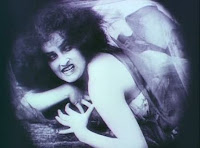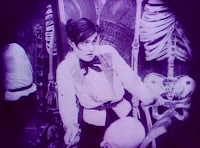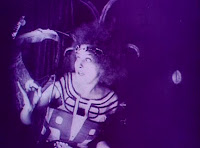 This was a film made in 1920 by Robert Wiene, director of (Das Cabinet des Dr. Caligari), and as you can see it mentioned vampire in (one of) its title(s). We previously looked at the 1916 Les Vampires as an honourable mention as, though primarily featuring a vamp, there was some vampiric allegory in the form of a dance.
This was a film made in 1920 by Robert Wiene, director of (Das Cabinet des Dr. Caligari), and as you can see it mentioned vampire in (one of) its title(s). We previously looked at the 1916 Les Vampires as an honourable mention as, though primarily featuring a vamp, there was some vampiric allegory in the form of a dance.
Genuine (Fern Andra), as a character, is fairly much a vamp rather than a(n undead) vampire but what we see is a bridge being built between the vamp and the vampire, Genuine seems to have magical abilities, there is some form of supernatural element included and she is called a witch at one point. The depths of this is perhaps difficult to say as all we have to go on is a 44 minute condensed version, which clearly has plot/logical holes due to the missing segments. I understand that the Munich City Film Museum archive holds a full length version.
 The film begins with the painter Percy Melo (Harald Paulsen) reading his favourite story. A picture is on the wall with Genuine in it. He falls asleep and she steps down from the painting – is all that now follows Percy’s dream? Is Genuine real? In what we see Genuine is a priestess of a strange, mystical Eastern religion. A war between tribes sees her captured.
The film begins with the painter Percy Melo (Harald Paulsen) reading his favourite story. A picture is on the wall with Genuine in it. He falls asleep and she steps down from the painting – is all that now follows Percy’s dream? Is Genuine real? In what we see Genuine is a priestess of a strange, mystical Eastern religion. A war between tribes sees her captured.
 She is taken to a slave market – and the appearance of naked breasts in the slave market scene, given when the film was made, felt daring to say the least. The film makes it clear that being there has corrupted her and made her fierce and savage. This is illustrated, when Lord Melo (Ernst Gronau) arrives to look at the slaves, by Genuine biting the hand of one of the slavers. She does have a fierce gleam in her eye. Melo buys her and his guard, the Malay (Lewis Brody), carries her off. She is placed in a sort of garden prison – below his home.
She is taken to a slave market – and the appearance of naked breasts in the slave market scene, given when the film was made, felt daring to say the least. The film makes it clear that being there has corrupted her and made her fierce and savage. This is illustrated, when Lord Melo (Ernst Gronau) arrives to look at the slaves, by Genuine biting the hand of one of the slavers. She does have a fierce gleam in her eye. Melo buys her and his guard, the Malay (Lewis Brody), carries her off. She is placed in a sort of garden prison – below his home.
 Every day Guyard (John Gottowt), a barber, attends Melo and shaves him; the old man has a habit of sleeping during his shave. However the townsfolk believe something odd is going on in the house and Guyard is called to answer questions for the town judge at the time of the next appointment. He arranges that his nephew Florian (Hans Heinrich von Twardowski) will attend the Lord the next day. In the meantime Melo gets a note to say that Percy, his Grandson, intends to visit.
Every day Guyard (John Gottowt), a barber, attends Melo and shaves him; the old man has a habit of sleeping during his shave. However the townsfolk believe something odd is going on in the house and Guyard is called to answer questions for the town judge at the time of the next appointment. He arranges that his nephew Florian (Hans Heinrich von Twardowski) will attend the Lord the next day. In the meantime Melo gets a note to say that Percy, his Grandson, intends to visit.
 As Florian is kept waiting, Genuine begins to climb a tree in order to escape her gilded cage. Florian is eventually given access to Melo, who falls asleep as usual whilst being shaved. The escaped Genuine enters the room, her movements exotic. Florian seems filled with both awe and dread at once. She starts making movements, indicating that he should slit Melo’s throat and he does so, it seems, almost involuntarily. This, it seems, indicates a power inherent in Genuine.
As Florian is kept waiting, Genuine begins to climb a tree in order to escape her gilded cage. Florian is eventually given access to Melo, who falls asleep as usual whilst being shaved. The escaped Genuine enters the room, her movements exotic. Florian seems filled with both awe and dread at once. She starts making movements, indicating that he should slit Melo’s throat and he does so, it seems, almost involuntarily. This, it seems, indicates a power inherent in Genuine.
 We get more supernatural shenanigans then as she warns that the Malay is coming and that Florian should get the ring as he will obey the bearer. He takes a ring off Melo’s hand and the Malay enters, sees his master dead and draws a dagger. Florian holds the ring up and he backs away. What power does it actually have? We do not know. However, having slept, Genuine suggests that Florian prove his love by killing himself like a sacrifice, she then takes the ring for herself and tells the Malay to kill Florian…
We get more supernatural shenanigans then as she warns that the Malay is coming and that Florian should get the ring as he will obey the bearer. He takes a ring off Melo’s hand and the Malay enters, sees his master dead and draws a dagger. Florian holds the ring up and he backs away. What power does it actually have? We do not know. However, having slept, Genuine suggests that Florian prove his love by killing himself like a sacrifice, she then takes the ring for herself and tells the Malay to kill Florian…
 We hit a huge jump in the film, what has happened to Florian (we discover some of it soon) and how did Percy react when he arrived and discovered his grandfather dead? We don’t know. We do know that Percy is in love with Genuine, he then becomes paranoid – believing she wants him dead – and finally his friend proves to her that she loves Percy by pretending he is dead and then revealing that he isn’t really, her devastation at the news proving her love.
We hit a huge jump in the film, what has happened to Florian (we discover some of it soon) and how did Percy react when he arrived and discovered his grandfather dead? We don’t know. We do know that Percy is in love with Genuine, he then becomes paranoid – believing she wants him dead – and finally his friend proves to her that she loves Percy by pretending he is dead and then revealing that he isn’t really, her devastation at the news proving her love.
 Meanwhile Florian is back with his uncle and quite ill. In his delirium he confesses to being a murderer but Guyard is having none of it, convincing the judge and the townfolk that Genuine is a witch… an angry mob goes in search of her…
Meanwhile Florian is back with his uncle and quite ill. In his delirium he confesses to being a murderer but Guyard is having none of it, convincing the judge and the townfolk that Genuine is a witch… an angry mob goes in search of her…
 As you can tell Genuine was very much the vamp and much less the vampire. Indeed her supernatural elements seem as much witchcraft and Guyard is probably not too wrong in his descriptor. She is also an abused woman, striking out at the men who have abused her. However, I mention this here as I think it closes a gap between the dangerous femme fatale of the vamp of early cinema with the supernatural. Two years later Murnau would define the cinematic vampire (or at least key elements thereof) in Nosferatu and our vampire would become a hideous, male creature of the night. One cannot help but think, however, that (at least in a small way) Genuine was one of the progenitora of the cinematic female vampires to come.
As you can tell Genuine was very much the vamp and much less the vampire. Indeed her supernatural elements seem as much witchcraft and Guyard is probably not too wrong in his descriptor. She is also an abused woman, striking out at the men who have abused her. However, I mention this here as I think it closes a gap between the dangerous femme fatale of the vamp of early cinema with the supernatural. Two years later Murnau would define the cinematic vampire (or at least key elements thereof) in Nosferatu and our vampire would become a hideous, male creature of the night. One cannot help but think, however, that (at least in a small way) Genuine was one of the progenitora of the cinematic female vampires to come.
The imdb page is here.
Friday, September 25, 2009
Honourable Mentions: Genuine – a tale of a vampire
Subscribe to:
Post Comments (Atom)
















No comments:
Post a Comment